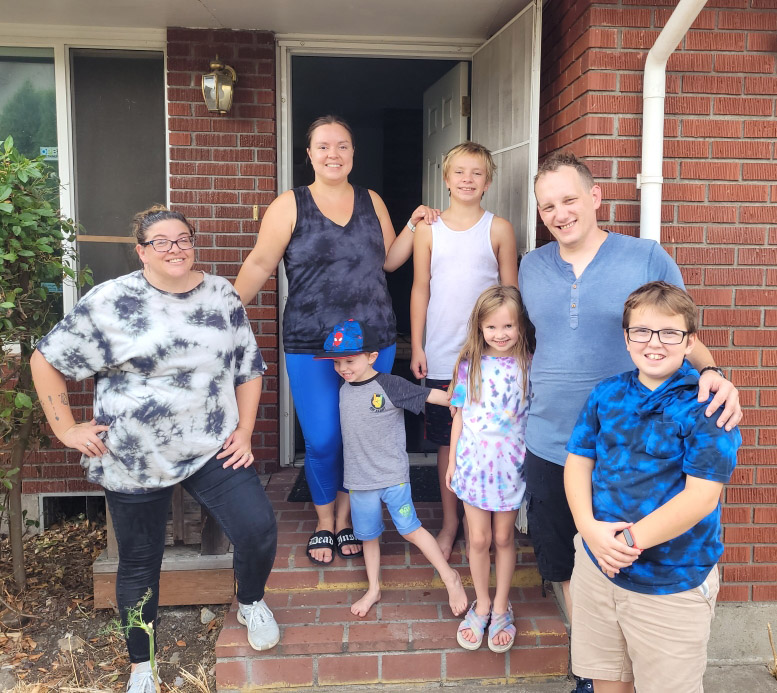
Robert and Julie Palmer are shown at the door of their new home on move-in day with kids Robert, Jameson, Winry and Maes. Krysta Matsen, their SSVF case manager, is at left.
For Robert and Julie Palmer’s four school-aged children, it probably seemed like one long, fun-filled summer road trip.
It even had a happy ending, when St. Vincent de Paul’s Supportive Services for Veteran Families (SSVF) program helped the family settle into their new Eugene-area rental home just two weeks before school started.
The Palmers kept the kids largely distracted from a harsh reality on their journey from Utah to Oregon. They meandered perilously along the border of homelessness.
“Summer made it a little bit easier,” says Robert, a U.S. Army Veteran. “It made it a lot less hard for our kids, being able to go to the beach, being able to walk on the trails. We tried to play it off as camping. We did the best we could do to just keep busy.
“By the time they finally heard us say we were homeless, they were like ‘What do you mean?!’”
Best-laid plans
The Palmers believed they had a good long-term plan when they made the decision to relocate from the Salt Lake City area where they lived in low-income housing.
A host of COVID-19 pandemic-related complications, unhappiness with living conditions at their apartment, and exploding housing costs across Utah — some of the nation’s highest — convinced them it was time to leave.
“We tried to stay in Utah, but with everything that happened after COVID and price hikes and everything, we went from looking to buy a house to just trying to find a place to live,” Robert says.
After also considering Nevada, Colorado and other states, they settled on Oregon and the Eugene area. For one thing, they believed it would offer rich employment and continuing education opportunities for Robert. He had worked as an EMT and EMS instructor after his four years in the Army, which included deployment to Baghdad in 2009-10.
The Palmers started planning their transition in January. They got everything ready to depart after the end of the kids’ school year, and saved seemingly sufficient funds to cover their move. A costly trailer-hitch failure early in their journey might have been an omen of financial struggles to come.
Despite all their research into costs of living, job prospects, and other factors in this area, they overlooked the fact that would arrive in Eugene right as the World Athletics Championships started in July. Visitors from around the world had booked every available form of lodging in the area for weeks solid. What could be found even relatively near town cost much more than typical rates, even $600 a night or more.
“Here we were, thinking we would have a decent amount of money to put a deposit on a place and time to look around,” Robert says. “Within two weeks we spent everything we had on hotels, storage units for all our things, and of course feeding ourselves and our kids.”
A call for help
For Robert and Julie, the reality soon become undeniable as they alternated between staying in motels when they could and camping in their two vehicles. They quickly depleted their cash along with any financial help they could get from family. They needed to seek help to get housed before they could land jobs and take other next steps.
“She finally said to me, ‘Do you want to sit in this hotel for one more night?’ I’m like ‘No, I don’t! I don’t want microwave food anymore. I don’t want to go find a 7-11 and figure out what we haven’t tried.’”
Still, he had to overcome his own proud self-sufficiency which was only reinforced through his military service. “It took me like three days to talk myself into making the phone call,” Robert admits. He learned of the SVdP-administered SSVF program through the Veterans Crisis Line (dial 988 then press 1).
After their intake meeting at SSVF’s Eugene offices and reassuring conversations with Rapid Re-Housing case manager Krysta Matsen, peace of mind quickly followed.
“They brought us in here, we did paperwork and they got us handed over to Krysta. It was only a couple weeks of looking and they got us our own place. It was great,” marvels Robert. “We were trying to figure out what was going to come next. Luckily, there wasn’t anything that had to come next after that.”
“It was so fast! They’ve been amazing,” echoes Julie. “We’ve had nothing but help and resources from this place. It was such a weight off of our chests, because we never thought we’d be in that position, especially with the kids.”
Making the case for SSVF
Like it does for all of its Veteran clients and their families, SSVF advocated for the Palmers in many ways to help them secure a stable home.
“A lot of property managers will try to say no because maybe someone doesn’t have income yet or whatever. But I knew we had to get this family housed and ready for school, so I really advocated for them a lot,” says Matsen.
“We help with different sorts of barriers, whether it’s past-due bills or arrearages, or legal stuff, whatever it is,” she explains. “The Palmers just had a couple things that we had to get taken care of.”
SSVF also connected the Palmers with resources for homeless families through SVdP’s First Place Family Center. These included access to a mailing address — a key first step in any transition to stability — as well as laundry, meal preparation and other day services.
SSVF covered necessary deposits and got the Palmers into their three-bedroom duplex using Rapid Re-Housing assistance designed to help low-income families quickly exit homelessness. Going forward, the Palmers will receive two years of rental assistance through SSVF’s Shallow Subsidy program.
Moving forward
Julie has a part-time job at a local law office that she expects to become full-time. Robert plans to use his GI Bill eligibility to enroll full-time at the University of Oregon early in the new year, studying biology and biochemistry, and hopes to find work in a related field. He suffers from effects of PTSD, like many of his fellow Veterans who saw combat duty, and feels a transition away from work in the emergency medical services will better serve his mental health.
Robert also still struggles with his own need to admit when he needs help. But he has already urged fellow Veterans in similar situations to do just that based on his recent experience with SSVF.
“I have a friend in Chicago who told me he was about to be homeless, and I was like ‘SSVF — go! If you’re really about to be homeless or something, just go!’”
